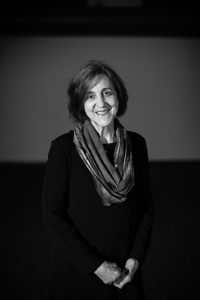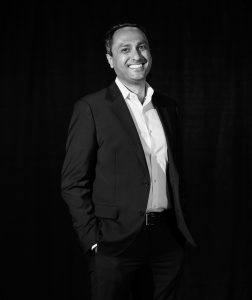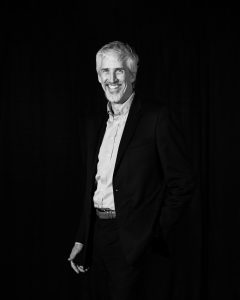Story by Amy Jessee | Photos by Colby Rabon
The weeklong celebration of the installation of UNC Asheville’s Eighth Chancellor Nancy J. Cable brought together national and regional thought leaders and UNC Asheville faculty for university-curated roundtable talks on five topics integral to higher education and at the forefront of public discussion. From the vital role of liberal arts and sciences education, an essential right to health and wellness, inclusive excellent and equity in the context of university partnerships to interfaith leadership in a religious democracy and climate implications of the thawing arctic permafrost, the discussions offered insights and inspiration. Here, we share a few words from the panelists and faculty respondents, each expert in their fields, locally and nationally.
To listen to the discussions in full, visit unca.edu/installation.
When the Association of American Colleges & Universities asked CEOs and hiring managers what they value most in new employees who graduated from colleges, the response sounded a lot like the liberal arts and sciences.
“They said they value students who can communicate effectively, who can write, speak and think with precision, coherence, and clarity, who can think ethically, and who can work with others different from themselves… In a globally interdependent world, we know that the best preparation we can offer our students is a liberal arts education that teaches them to be adaptable and flexible in the face of this rapid change. It teaches them to be innovators in their own lives, prepares them not only for their first job but for their final job,” said Lynn Pasquerella, president of the Association of American Colleges and Universities (AAC&U) in her opening on a key issues roundtable discussion on the vital role of the liberal arts and sciences in the future of our democracy.
Joined on the stage by Jon Peede, chair of the National Endowment for the Humanities, and Dr. Lawrence T. Potter, chief academic officer and provost at the University of the District of Columbia, Dr. Pasquerella stated, “So much of what we have to do is tell our story in a more compelling way.”
The panel proceeded to do just that, pulling from the extensive experience of faculty respondents Dr. Patrick Bahls, Honors Program director and professor of mathematics; Dr. Lyndi Hewitt, Sara and Joseph Breman Professor of Social Relations and associate professor of sociology, and Women, Gender and Sexuality Studies Program director; and Dr. Keya Maitra, professor of philosophy and the Thomas Howerton Distinguished Professor of Humanities.
Starting A Narrative
“What struck me from our conversation is the importance of a narrative and the importance of a story to tell, whether it’s informing the community and the communities we work with, the stakeholders we are beholden to, particularly as a public liberal arts university, and helping them understand what we are about. One of the things we could do a better job of is articulating our narrative. What is liberal education from the point of view of UNC Asheville? What is it we conceive of as liberal arts and sciences, and how does the rubber hit the road? In other words, how do the ideas we talk about on campus engage with the community?” said Dr. Bahls. He answered his own question seconds later, “It’s about freeing the mind to be open to all of these ideas, and to think in big ways, but clear and focused ways about the problems that face us all.”
The second panel took up this topic in the sector of health and wellness, with Dr. Rita Charon, founder and executive director of the Program in Narrative Medicine at Columbia University leading the discussion, along with local expert, Dr. Jeff Heck, president and CEO of MAHEC.

“In order to mobilize and motivate any of us to do work toward improving, we have to be able to enter others’ narrative worlds and understand them, and understand what are their predicaments, what are their fears, their hopes. When I meet a new patient, I tell them to tell me what you think I should know about you…. The point is that in that intimate conversation a clinician and a patient can even begin to decide together what are the problems and what it is we want to work with,” said Dr. Charon.
The promising partnership between UNC Asheville and MAHEC, with additional collegial collaboration from the UNC Gillings School of Global Public Health, is one such example of this approach, according to Dr. Amy Lanou, chair and professor of health and wellness and executive director of the North Carolina Center for Health and Wellness. She and faculty respondents Dr. Ameena Batada, associate professor of health and wellness; Dr. John W. Brock, associate professor of analytical chemistry and toxicology; and Dr. Ted Meigs, GlaxoSmithKline Professor of Molecular and Chemical Biology, shared details of their work.
“In addition to being present with ourselves and understanding our own stories and our own histories, we need to think about doing public health or health promotion or even health care in a particular place. What do you need to know—history, story, trauma that the place has experienced, any of those kinds of things. What is it that people love about being there,” Dr. Lanou said.
Buncombe County Commissioner and UNC Asheville Trustee Emeritus Al Whitesides focused even more closely on place in the third panel.
“If we are going to make the changes that we need to make in this community, that we’ve started and continue to finish, it’s got to start right here at the University of North Carolina at Asheville, because we are an important part of the community, and we are the change agent. We are the engine. We have the minds here—the students. We are to prepare them to be good citizens once they leave, and to be productive citizens. In order to do that, we’ve got to think about diversity and inclusion as critical,” he said.
The People and the Place
The panel on “Inclusive Excellence and Equity: The Power of a University Partnership” brought together local leaders, including Commissioner Whitesides; Debra Campbell, city manager, City of Asheville; Kimberlee Archie, equity & inclusion manager, City of Asheville; and Frank Goldsmith, retired civil rights attorney and a leader in Carolina Jews for Justice. As each defined and described their work in diversity, inclusion, and equity, Dr. Lawrence T. Potter, chief academic officer and provost at the University of the District of Columbia, shared an example of how to embed it into the university, as did faculty respondents Dr. Trey Adcock, assistant professor of interdisciplinary studies and director of American Indian and indigenous studies; Dr. Agya Boakye-Boaten, chair and associate professor of Africana and interdisciplinary and international studies; Dr. Tiece Ruffin, associate professor of Africana studies and education; Dr. Darin Waters, associate professor of history and executive director of community engagement.
Dr. Potter spoke in the first panel as well.
“When I think about the liberal arts in the context of our democracy today, I think about the liberal arts and sciences in the sense of looking out towards the future, and you really can’t project the future. I think we create the future now, and when we create the future now, we create a future that is representative of the inclusive excellence that represents the shift in demographics in this country,” he said. “It’s one thing for students to come to our campuses and engage with our faculty, it’s another thing in terms of how those students are prepared when they leave
the institution and engage with our world.”
“I hope our students see inclusion as something transformative,” said Dr. Ruffin.
“One thing that I’ve always kept in mind in terms of my own experience is that when we have communiversity—community and university blended—that university students are not interacting with local people from a savior missionary complex,” she said. “I believe we do really well here at UNC Asheville, as a communiversity, with the city of Asheville as well as the university. We prepare our students to have the ideology that when we go out in the AVID Program for 20 years, that there is credibility in the indigenous knowledge. If we are going to work in an equitable way, cooperatively
where there’s reciprocity and mutual benefit, then we have to recognize that we all bring knowledge and skills to the table.”
Skills, Seminars, and Senior Capstones

“How do you prepare graduates from UNC Asheville to be nurses, teachers, social workers, city managers in this highly religiously diverse democracy? From first year seminars to senior capstones, how might you think about the future of interfaith leaders at UNC Asheville?” asked Eboo Patel, author, founder and president of Interfaith Youth Core, and Rhodes Scholar whose most recent text is Interfaith Leaders.
Faculty respondents from religious studies provided answers to those questions, with Dr. Rodger Payne, chair and professor of religious studies; Dr. Kate Zubko, associate professor of religious studies, NEH Distinguished Professor in the Humanities, 2018-21; Dr. Marcus Harvey, assistant professor of religious studies, and Dr. Rick Chess, Roy Carroll Professor of Honors Arts and Sciences and director of the Center for Jewish Studies, rounding out the panel on “The American Dream: Interfaith Leadership in a Religious Democracy.”
Dr. Chess had a creative solution: “In creative writing classes, there’s a wonderful opportunity to teach students how to transform their lived experience into art. The religiously and/or fiercely held secular experiences could really be a focus for some phenomenal creative writing that would give the students the opportunity to inquire more deeply into their lives at the same time they are learning the craft and discipline of creative writing. Then there’s an opportunity when you start thinking about the craft of writing poetry and prose, and you start thinking of it as a discipline that has analogies to religious discipline and practice and spiritual discipline and practice, which helps cultivate culture and character traits that are held in common among many religious traditions,” he said.
Leading to Shared Understanding

“We have to keep doing the science, that’s what we do every day—refining our understanding of how quickly permafrost is going to thaw and refining our understanding of what happens when it does thaw… We need to do a lot more. Part of that is communicating the science, to different audiences, to policymakers, to voters, to students, to everybody. We have to think of what we can do to shorten the gap between what we know from the science to what we hope will be the wise application of public policy. We also need to train the next generation,” said Deputy Director and Senior Scientist at Woods Hole Research Center Max Holmes in the final panel of the two-day series.
The faculty respondents on the roundtable addressing “The Thawing for the Arctic Permafrost: Climate Implications” educate the next generation each and every day. Environmental scientists Dr.
Dee Eggers, associate professor of environmental studies; Dr. David Gillette, associate professor of environmental studies; Dr. Andrew Laughlin, assistant professor of environmental studies; and Dr. Evan Couzo, assistant professor of STEM education and coordinator of the 6-12 mathematics licensure program, shared their experiences.
“I’ve struggled myself with the question Max asked at the end, ‘Where is the good news?’” said Dr. Couzo, noting that he’s focused in on the idea through his recent work and courses on climate communication. “There’s another piece that comes out of the communication, that integrates my role as a scientist and as someone at the university who trains the next generation of math and science teachers, and it’s ‘Where is the climate science in our standards and in public schools?’…. There’s a real need there, and it’s a communications piece. Experts need to start working with teachers to communicate what we know in a way that regular people can understand.”
That’s just what these roundtables have started to do, a first step in shared communication and shared understanding, bringing together the university and community in conversation and building upon the bold work of thought leaders near and far.
